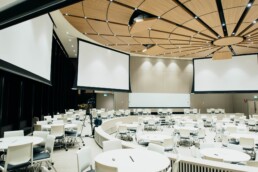How to Craft Your New Site Visit Checklist Post COVID-19
Cleanliness 
As businesses slowly begin to reopen, it will be important as you plan your events to consider the health and safety of the guests. At this point, there should be more evident measures that the venue has or is doing to ensure the health or safety of both their staff and guests. As you complete your site visits, evaluating the protocols they have put in place such as cleanliness of the bathroom should be considered. Ask them, how often will the bathrooms be cleaned and disinfected during your event? In addition, you should evaluate the safety protocols for their staffers, will they be wearing masks now as they pass around appetizers and interface with the guests? What are they doing to take precautions with food preparation  and have serving methods changed, we already know buffets are a thing of the past - will individual food containers be a thing of the future?
Social Distancing
Will events be limited to 25% capacity, 50%, or are we concerned at all? Other things to consider is venue space and options to accommodate social distancing requirements. Does the venue have outdoor space to use, how tall are the ceilings in the room(s), how updated is the ventilation system and air filters, can we use multiple rooms to allow social distancing. How will the seating or furniture arrangements be changed to limit the amount of guests from being in too close proximity of each other. Will attendees be required to wear masks and what protocols are in place to encourage attendees to self monitor themselves prior attending the event and what is the protocol on how to handle anyone that experiences symptoms during the event.
Tech capabilities
Every planner looks for in-house A/V capabilities when on their site visit, but what we should be looking for now is built-in cameras for broadcasting our event online. As more and more businesses open their doors, we need to remember that not everyone will feel comfortable going back out right away. People will come back in waves and it will depend heavily on the individual generation, personality, location, upbringing, and their overall comfort level with COVID-19. Providing alternate solutions such as hybrid events should be kept in mind thus the importance of venue tech capabilities. To increase a good turnout technological solutions will allow planners to incorporate both live and virtual events.
In-House or Preferred Vendors
With any venue that we are selecting for our next in-person event, we must find out if they use in-house catering and A/V, or do they outsource to their list of preferred vendors. One would hope that  the  venue will try to extend whatever new health & safety policies and set the expectations with their preferred partners. While leveraging in-house services may be more attractive over having several vendors in play to limit the possible transmission of coronavirus it is important that your client feels confident with the health and safety measures that are put in place for all resources used. Some venues will be required to utilize union resources so it will be important to confirm safety measures are put in place for any vendor whether it is onsite resources, offsite resources and union resources.
Location
As the largest cities in America are still on lockdown, planners are looking to other less populated destinations for their next event. Not only will they be opening earlier, but it will be easier to incorporate social distancing in a more spread out area than your normal big city such as New York. It will be important to ask your venue what protocols they have in place for things such as public elevator access. Can the event planner incorporate any regulation on the number of people in the elevator at a time? Will the area be designated just for event participants or will multiple events be taken place and/or open to the public. Is your event in a private or semi-private space will be more important than ever.  
3 Tips for Maximizing Procurement and Vendor Relationships
The first step in any great event is, well, finding a place to host it! Any good event planner knows that finding the perfect venue and developing a relationship with the venue - s sales team, marketing department, and catering team is imperative to the outcome of the event. We spoke to three successful Chicagoland event planners at PlannerPalooza! and got their best tips for maximizing procurement strategies and vendor relationships.
Details, Details, Details!
Leave no stone unturned - a detailed RFP is your friend says Bailey Shultz, Account Manager for Sourcing at NHS Global Events. Shultz says that a detailed RFP is helpful for a few reasons; in a saturated market, distinguishing your business from others is necessary, too few details make you a less desirable candidate and will not elicit a response, and small details help to determine an accurate budget. Jackie White, Director of Events & Conference Services at Illinois Institute of Technology, says that identifying and including all of the - what ifs - and potential acts of God that could take place in a particular city will help both parties build a strong foundation ahead of an event.
Make It Personal
What better way to build a relationship with a venue than to actually get to know the people behind the title - White says that taking the time to get to know a vendor on a personal level has helped her to build lasting and mutually beneficial professional relationships. Perhaps a sales manager at a catering company just got married or has a birthday coming up; a card in the mail or a small gift is a meaningful and personal touch that will help you remain top of mind in the future. Jay Weidner, Managing Partner at On The Scene noted that taking the extra step in finding what the client truly wants and identifying their objectives will show that you - ve done the due diligence in ensuring the event is successful. Weidner also said that you may find that the client is not always the stakeholder and their ultimate objectives may be different. Get to know the people you - re working with on a more personal level to better define their goals!
Money matters in the event industry! Vendor relationships rely heavily on efficient spending and saving. Weidner says that it - s now more important than ever to find the main items that clients are NOT making money on, and find a workaround to monetize those. Maybe they aren - t making money off of name badges or transportation; a sponsor can offset those costs and either save the client money with in-kind sponsorships or earn money with a paid sponsorship. White suggests finding out if the sales team of one of your vendors is trying to reach a bonus or a perk; if they are, work out a mutually beneficial contract that helps save your client some money and the sales person reach their quota.
Sources: -
Jackie White, Director of Events & Conference Services
Illinois Institute of Technology
Jay Weidner, Managing Partner
On The Scene
Baily Shultz, Account Manager - Sourcing
NHS Global Events
4 Non-Traditional Venues Planners Are Loving Right Now

Sometimes the hallmark of a great event is a memorable venue - a place that attendees may have never attended, a unique space local to the host city, or a fun spot that offers the opportunity for interaction. As meeting and event planners work to find new ways to make their events more exciting and stand apart from run-of-the-mill banquet hall settings, non-traditional venues are seeing a spike in meeting and event activity.
We discussed this very topic at a recent Planner Master Class with nearly 100 meeting and event planners. Here are 5 types of non-traditional venues that meeting and event planners are loving right now:
Sports Stadiums
Many professional and college sports stadiums have ample space for larger groups and the planners we spoke to have taken full advantage of that space! Field-view banquet rooms can be set up in a plethora of ways and the stadium can often provide the catering on-site. One planner at the Planner Master Class hosted a meeting at Wrigley Field on a non-gameday and as an added bonus, was able to offer her attendees a tour of the stadium as well. Another planner utilized Lambeau Field in Green Bay, Wisconsin for a corporate seminar; in addition to the main general assembly, she was able to sell sponsors the smaller suites at VIP level to later use as smaller breakout networking sessions.
Breweries
The meeting and event planners we spoke with agreed that food and alcohol is often a significant draw to getting people to attend their events in the first place. That being said, breweries have proven to be a great venue for events! Not only do breweries often have space large enough for a big group, the added benefit of offering brewery tours and tastings makes for a unique and memorable event experience. Many breweries can offer their own catering on site, and spaces without a kitchen are usually open to outside catering, according to a number of planners at the Planner Master Class.
Museums and Galleries
Looking for a venue with character but don't want to provide your own decor? Check out event space at museums and art galleries! Already decorated beautifully, these venues are a unique break from sterile-looking banquet rooms that your attendees will love. One planner at the Planner Master Class held an event at the Cleveland Rock and Roll Museum and saw a jump in attendee registration when the venue was announced. Another planner noted that many local attendees may not go to galleries or museums in their spare time, so it's fun for them to have an 'excuse' to check out new exhibits and spend time in a local landmark.
Cruise Boats
It doesn't get more non-traditional than a venue on the water! A surprising number of Planner Master Class attendees have hosted meetings and events on large cruise boats. Planners agreed that the outdoor environment inspires a fun, exciting attitude going into the event and helps to maintain positivity throughout. Attendees have loved the open space, nautical themes, and interesting concept, and planners have loved the ease of organizing as cruise boats have on-site catering and staffing.



